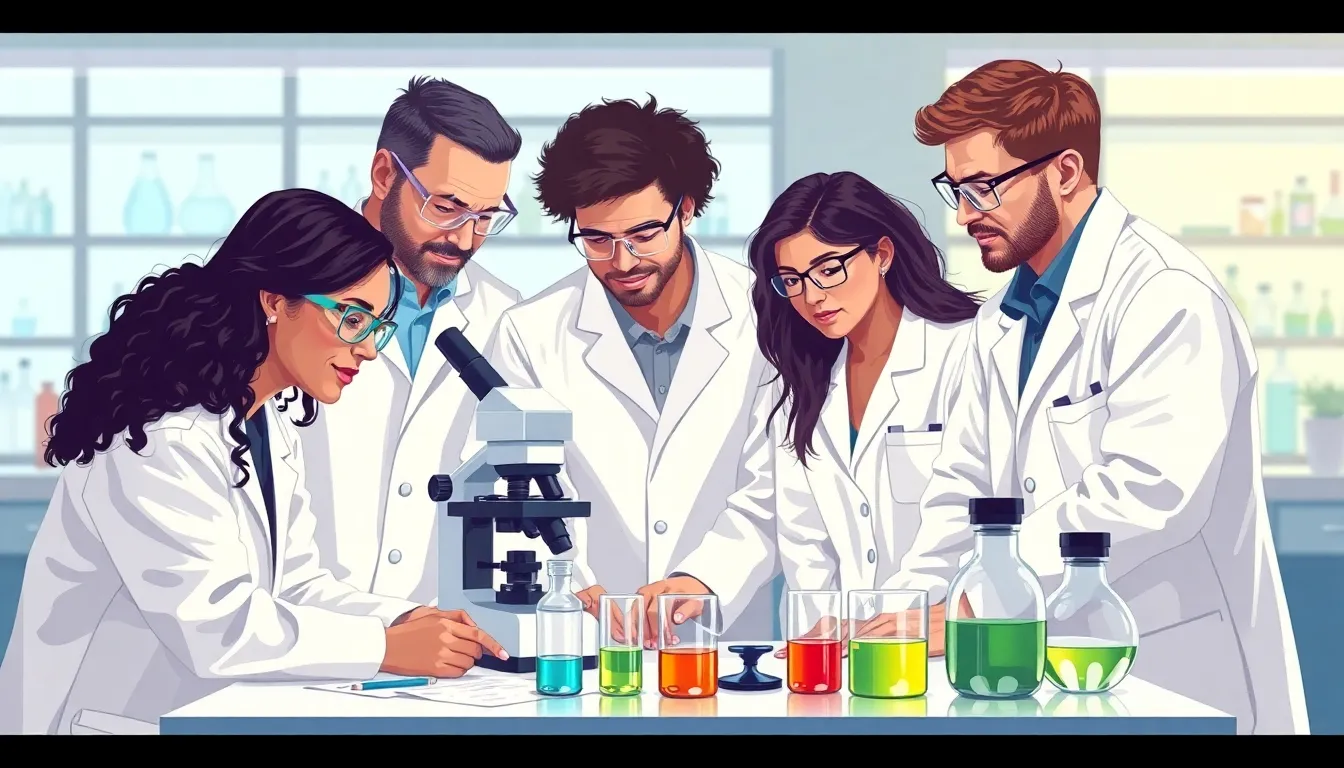In the fast-paced world of biotechnology, innovation is the name of the game. But what happens when groundbreaking discoveries collide with the legal labyrinth of patents? Enter the realm of biotech patents, where the stakes are high and the rules can feel as tangled as a scientist’s lab coat after a long day.
Table of Contents
ToggleOverview of Biotech Patents
Biotech patents protect innovations in the biotechnology sector, which includes genetic engineering, pharmaceuticals, and agricultural improvements. These patents cover various inventions, such as novel microorganisms, genetic sequences, and biopharmaceutical products. The U.S. Patent and Trademark Office (USPTO) issues patents based on the requirements of novelty, non-obviousness, and utility.
Regulations surrounding biotech patents can be complex. The Supreme Court has made several landmark rulings impacting patentability. In 2013, the Court ruled in Association for Molecular Pathology v. Myriad Genetics, Inc. that isolated human genes cannot be patented, significantly shaping the landscape of genetic patents. Such decisions raise critical questions about the balance between encouraging innovation and ensuring public access to biotechnological advances.
Filing a biotech patent typically involves several steps. Applicants must conduct thorough prior art searches to assess existing patents. After gathering information, preparing a detailed application is crucial. This application should include comprehensive descriptions of the invention and its potential uses.
Patent litigation can be costly and time-consuming. Firms often face challenges when defending their patents against infringement or invalidation claims. Thus, managing a biotech patent portfolio strategically is essential for companies aiming to secure their market position.
Awareness of international patent laws also plays a vital role. Countries have varying regulations regarding biotech patents, making it important for companies operating globally to understand different jurisdictions.
Innovation will continue to drive the biotechnology field, ensuring that the complexities of patent law remain central to its evolution. Each development contributes to the ongoing dialogue about intellectual property rights within the rapidly advancing biotech landscape.
Importance of Biotech Patents

Biotech patents play a crucial role in fostering innovation and economic growth. They protect unique inventions, ensuring that creators can benefit financially.
Economic Impact
Biotech patents significantly contribute to the economy by driving investment into research and development. Innovations in this field have led to new products and therapies, stimulating job creation in biopharmaceuticals and agricultural sectors. The sector generated approximately $469 billion in revenue in 2022, showcasing its financial importance. Investment in biotech companies often hinges on the assurance of patent protection, which allows these companies to secure funding for groundbreaking work. Furthermore, job opportunities in high-skill areas arise as a direct result of patented developments. These jobs not only support local economies but also elevate national economic stability.
Advancements in Research
Biotech patents encourage advancements in research by providing a framework for protection and commercialization. Researchers can pursue innovative ideas without the fear of losing their intellectual property. As a result, collaboration between academic institutions and private companies flourishes, leading to significant breakthroughs. Patent protections cover diverse areas, including genetic therapy and disease treatment technology, resulting in a faster pathway for the translation of research into practical applications. Patents also incentivize academic and industry partnerships, thereby enhancing the overall innovation ecosystem. Their presence ensures that scientific discoveries translate into tangible health benefits and solutions for global challenges.
Challenges in Biotech Patent Law
Numerous challenges exist in biotech patent law, primarily concerning legal complexities and ethical implications. Navigating these challenges requires careful consideration of both legal frameworks and moral standards.
Legal Issues
Legal disputes often arise over patentability, particularly regarding discoveries relating to natural phenomena. Courts frequently face significant cases that shape patent law, such as the 2013 ruling in Association for Molecular Pathology v. Myriad Genetics, which emphasized that isolated human genes lack patent eligibility. Definition of prior art proves challenging as biotechnology evolves rapidly, complicating the patent filing process. Filing inadequate claims or unclear applications leads to rejection by the USPTO, risking valuable innovations. Enforcement of patents invites further complexities related to infringement cases that can result in lengthy and expensive litigation. Patent holders face difficulties establishing a clear boundary for their innovations, amid ambiguity in legal standards.
Ethical Considerations
Ethical considerations play a vital role in biotech patent law discussions. The commodification of human genes raises significant moral questions regarding access to scientific advancements. Concerns arise about public health implications, especially when patented biotechnological solutions limit access to essential treatments. Equity in healthcare and the potential for monopolies challenge the ethical landscape of biotech innovation. Researchers and companies often debate the balance between incentivizing innovation and ensuring widespread access. Transparency in patent practices promotes ethical standards and fosters public trust in biotechnology developments. Stakeholders must prioritize ethical considerations alongside legal protections to navigate the intricate relationship between innovation and public good in this rapidly changing field.
Trends in Biotech Patents
Trends in biotech patents reflect both innovation and legal challenges in biotechnology. Emerging technologies and a shifting global patent landscape play significant roles in shaping these trends.
Emerging Technologies
Biotech patents increasingly target cutting-edge fields like CRISPR, synthetic biology, and personalized medicine. Researchers combine genetic engineering techniques with artificial intelligence to advance drug discovery. Patents in these areas secure funding for continued research and development. Fast-moving innovation necessitates that applicants provide robust patent claims to protect their inventions effectively. Notably, the number of patents granted in gene editing surged significantly in recent years, highlighting the intersection of technology and legal frameworks.
Global Patent Landscape
The global patent landscape exhibits considerable variation in regulatory practices. Countries differ in criteria for patentability, affecting how biotechnology firms operate internationally. For instance, some nations grant patents on living organisms, while others impose strict restrictions. Current trends show a rise in international collaborations, driven by the need for shared innovations and resources. These partnerships often lead to cross-border patent filings, simplifying access to global markets. Patent strategies must account for these diverse regulations to maximize opportunities and mitigate risks.
Case Studies in Biotech Patents
Examining case studies in biotech patents reveals a landscape of innovation and legal complexity. Successful patents demonstrate how effective protection of unique inventions drives progress in the field.
Successful Patents
Successful patents often showcase groundbreaking technologies that transform healthcare and agriculture. One notable example includes Genentech’s patent for recombinant human insulin, which significantly improved diabetes management. This innovation paved the way for further advancements in biopharmaceuticals. Another example is the CRISPR-Cas9 technology, patented by the Broad Institute, which revolutionized gene editing. The rapid expansion of patents around gene editing highlights the importance of clear and robust patent claims. Each successful patent strengthens investment opportunities and fosters ongoing research initiatives in the biotech sector.
Controversial Patents
Controversial patents raise ethical concerns while pushing the boundaries of patent law. An instance involves the patenting of human genes, exemplified by Myriad Genetics’ patent on the BRCA1 gene, which faced legal challenges due to public access implications. With the Supreme Court ruling that isolated human genes cannot be patented, this case epitomizes the conflict between innovation incentives and public health considerations. Another contentious issue arises from patents on genetically modified organisms (GMOs), which prompt debates concerning environmental sustainability and food security. Such controversies highlight the need for ongoing dialogue in the biotech community to balance interests and drive ethical advancements in innovation.
The landscape of biotech patents remains a dynamic interplay of innovation and legal intricacies. As biotechnology continues to evolve at a rapid pace, the importance of robust patent protections becomes increasingly clear. These patents not only safeguard groundbreaking discoveries but also drive investment and economic growth across various sectors.
Navigating the complexities of patent law is essential for stakeholders aiming to balance ethical considerations with the need for innovation. Ongoing discussions about access to patented technologies will shape the future of biotechnology, ensuring that advancements benefit society as a whole. The dialogue surrounding biotech patents will undoubtedly continue to influence how scientific breakthroughs translate into real-world solutions.




